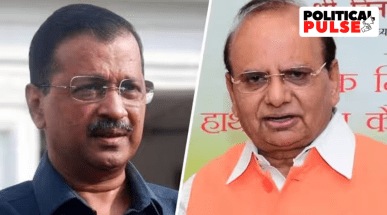Delhi services Act: A look at BJP’s changing stand on Capital’s powers, and another Bill
2003 Bill moved by Advani, while Vajpayee was in power at Centre, did not propose any major alterations to the appointment procedures, composition or operations of services in Delhi.

With the passage of the Delhi Services Bill (GNCTD Amendment Bill), the Centre has granted the Delhi Lieutenant Governor authority over the appointment of bureaucrats and placed limits on the Legislative Assembly.
“The BJP has agitated for nearly 40 years from 1977 to 2015 to get full statehood status for Delhi. (Then PM) Vajpayee and Deputy PM Advani had brought a Bill to give Delhi the status of a state (in 2003). The BJP National Executive decided to give statehood to Delhi. The BJP has been promising people that they would make Delhi a state… It has been a part of the party manifesto since 1989,” Chadha said.
After Delhi was made a Union territory in 1956, it was governed by a municipal corporation till 1966, and then an elected metropolitan council till 1990. After years of growing support for Delhi’s statehood, the Sarkaria Commission, set up in 1987, recommended the establishment of a Legislative Assembly through a Constitutional amendment.
The amendment was cleared in 1991 and Delhi held its first Assembly polls in 1993.
Since then, calls to grant Delhi statehood have always been coloured by politics. Depending on the parties in power at the Centre and the Assembly, the demand for statehood has ebbed and flowed.
The Advani Bill
In 2003, ahead of the Assembly elections, with the Sheila Dikshit-led Congress government in power, Advani introduced the State of Delhi Bill in the Vajpayee-led Lok Sabha to grant the UT full statehood.
The Bill envisaged the Centre retaining control of law and order and public security issues, but it was unclear if the subject of land fell under the state or central list.
In the event of a conflict between the Centre and Delhi, the Bill said, the former would have the authority to apply binding orders on the state government.
The Bill also sought to repeal Articles 239AA and 239AB, which granted Delhi its special status, placed limits on the subjects the Assembly could legislate on, and gave the Lieutenant Governor and the President the power to intervene “in case of failure of Constitutional machinery”.
The difference with Delhi services Act
Unlike the recently passed Act, the 2003 Bill did not propose any major alterations to the appointment procedures, composition or operations of services in Delhi.
However, the 2003 Bill stated that the Centre could set up advisory committees to assist the state government in establishing the division of services between the state and the Centre. The Centre also proposed that it could issue binding directives to the state government on the administration of services if deemed necessary.
Incidentally, in 2002, the Delhi Assembly had passed a resolution on statehood, demanding that land and law and order too be brought under the state government’s ambit. The Congress initially wanted the Centre to retain control of law and order but later suggested day-to-day law and order management should fall partly under the state government.
The BJP, however, had demanded that the Delhi Police be administered by the state government.
The fate of the 2003 Bill
The Delhi government was not consulted before the Bill was introduced, and CM Dikshit termed the legislation ambiguous and a political stunt.
“The fact is that police and public order remain with the Centre, which totally negates the concept of full statehood. The provision under which the Centre’s directions, in case of differences with the Delhi government, were binding on the state government also negates the concept,” Dikshit said.
The provisions of the Bill were a poll promise of the BJP in the campaign that followed, even as the legislation was pending in a Parliament Standing Committee.
But, after the BJP lost the election later that year, winning 20 seats compared to the Congress’s 47, the Bill was quietly abandoned.
Between 2004 and 2014, while in opposition at the Centre, the BJP kept speaking of statehood for Delhi, even including it in its manifesto for the 2013 Assembly polls.
But since it came to power at the Centre in 2014, the party has withdrawn its demand for Delhi’s statehood and now fully opposes it.
Meanwhile, the Congress remained in power in Delhi till 2013, and since then the state has been under AAP control.